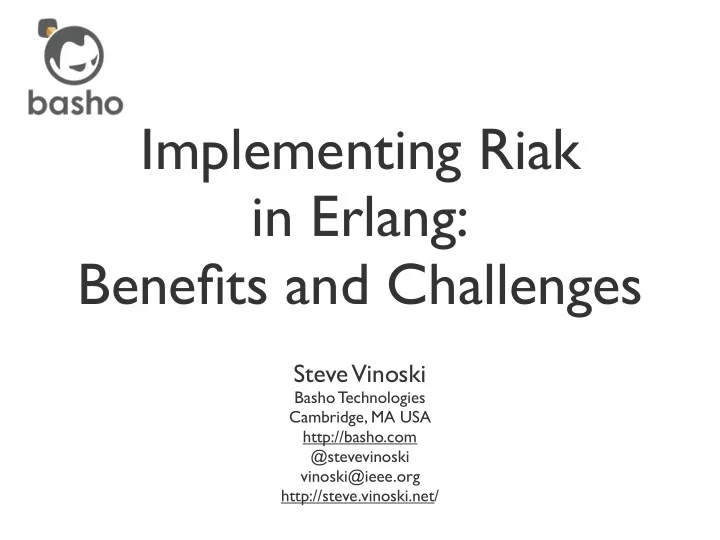

Riak Core Riak Clients Riak API Riak KV eLevelDB Memory Bitcask Multi
Riak Core Riak Clients Riak API Riak Core Riak KV eLevelDB Memory Bitcask Multi
Riak Core Riak Clients Riak API • consistent • gossip protocols • virtual nodes hashing Riak Core • vector clocks (vnodes) • sloppy quorums • hinted handoff Riak KV eLevelDB Memory Bitcask Multi
N/R/W Values
Hinted Handoff
Hinted Handoff • Fallback vnode holds data for unavailable actual vnode
Hinted Handoff • Fallback vnode holds data for unavailable actual vnode • Fallback vnode keeps checking for availability of actual vnode
Hinted Handoff • Fallback vnode holds data for unavailable actual vnode • Fallback vnode keeps checking for availability of actual vnode • Once actual vnode becomes available, fallback hands o fg data to it
Old Issue with Handoff • Hando fg can require shipping megabytes of data over the network • Used to be a hard-coded 128kb limit in the Erlang VM for its distribution port bu fg er • Hitting the limit caused VM to de-schedule sender until the dist port cleared • Basho's Scott Fritchie submitted an Erlang patch that allows the dist port bu fg er size to be configured (Erlang version R14B01)
Read Repair • If a read detects a vnode with stale data, it is repaired via asynchronous update • Helps implement eventual consistency • Next version of Riak also supports active anti-entropy (AAE) to actively repair stale values
Core Protocols • Gossip, hando fg , read repair, etc. all require intra-cluster protocols • Erlang features help significantly with protocol implementations
Binary Handling • Erlang's binaries make working with network packets easy • For example, deconstructing a TCP message (from Cesarini & Thompson “Erlang Programming”)
Binary Handling <<SourcePort:16, DestinationPort:16, SequenceNumber:32, AckNumber:32, DataOffset:4, _Rsrvd:4, Flags:8, WindowSize:16, Checksum:16, UrgentPtr:16, Data/binary>> = TcpBuf.
Binary Handling <<SourcePort:16, DestinationPort:16, SequenceNumber:32, AckNumber:32, DataOffset:4, _Rsrvd:4, Flags:8, WindowSize:16, Checksum:16, UrgentPtr:16, Data/binary>> = TcpBuf.
Binary Handling <<SourcePort:16, DestinationPort:16, SequenceNumber:32, AckNumber:32, DataOffset:4, _Rsrvd:4, Flags:8, WindowSize:16, Checksum:16, UrgentPtr:16, Data/binary>> = TcpBuf.
Protocols with OTP • OTP provides libraries of standard modules • And also behaviours: implementations of common patterns for concurrent, distributed, fault-tolerant Erlang apps
OTP Behaviour Modules • A behaviour is similar to an abstract base class in OO terms, providing: • a message handling loop • integration with underlying OTP system (for code upgrade, tracing, process management, etc.) 58
OTP Behaviors • application • supervisor • gen_server • gen_fsm • gen_event
gen_server • Generic server behaviour for handling messages • Supports server-like components, distributed or not • “Business logic” lives in app-specific callback module • Maintains state in a tail-call optimized receive loop 60
gen_fsm • Behaviour supporting finite state machines (FSMs) • Same tail-call loop for maintaining state as gen_server • States and events handled by app- specific callback module • Allows events to be sent into an FSM either sync or async 61
Riak and gen_* • Riak makes heavy use of these behaviours, e.g.: • FSMs for get and put operations • Vnode FSM • Gossip module is a gen_server 62
Behaviour Benefits • Standardized frameworks providing common patterns, common vocabulary • Used by pretty much all non-trivial Erlang systems • Erlang developers understand them, know how to read them 63
Behaviour Benefits • Separate a lot of messaging, debugging, tracing support, system concerns from business logic incoming callback messages OTP App gen_* callback module module outgoing replies messages 64
application Behaviour • Provides an entry point for an OTP- compliant app • Allows multiple Erlang components to be combined into a system • Erlang apps can declare their dependencies on other apps • A running Riak system comprises about 30 applications 65
App Startup Sequence • Hierarchical sequence • Erlang system application controller starts the app • App starts supervisor(s) • Each supervisor starts workers • Workers are typically instances of OTP behaviors 66
Workers & Supervisors • Workers implement application logic • Supervisors: • start child workers and sub- supervisors • link to the children and trap child process exits • take action when a child dies, typically restarting one or more children 67
Let It Crash • In his doctoral thesis, Joe Armstrong, creator of Erlang, wrote: • Let some other process do the error recovery. • If you can’t do what you want to do, die. • Let it crash. • Do not program defensively. see http://www.erlang.org/download/armstrong_thesis_2003.pdf 68
Application, Supervisors, Workers Simple Core 69
Recommend
More recommend